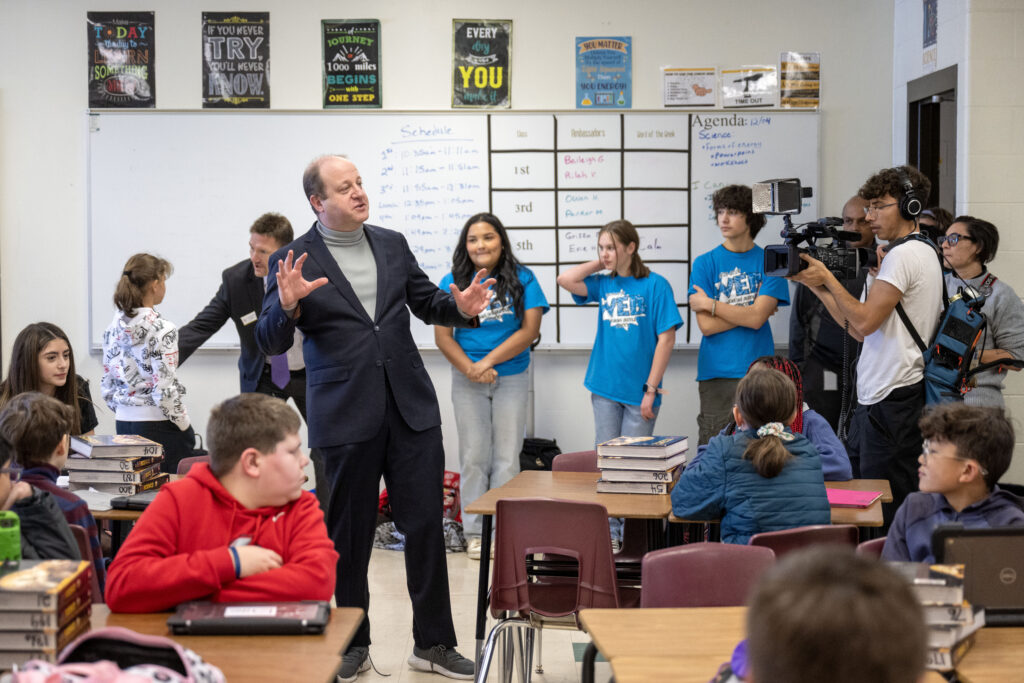Colorado lawmakers push for stricter social media regulation to curb youth drug use and addiction
Sixteen-year-old Avery Ping of Olympia, Washington, was like many of his peers. He used social media daily to stay connected with friends, keep tabs on celebrities and influencers, and watch videos. Last December, he used the photo messaging app Snapchat to purchase MDMA, also known as ecstasy or molly.
That choice ended up costing him his life.
Unbeknownst to Avery, the drugs he purchased were laced with fentanyl. According to Aaron Ping, Avery’s father, the man who sold his son the drugs was a well-known dealer among local teens. To Aaron’s horror, a drug task force had subpoenaed Snapchat just two months before Avery’s death, seeking records of the dealer’s account. The company took over a month to comply.
Social media makes buying drugs as easy as ordering food for delivery, Ping told the Colorado Senate Judiciary Committee last month.
“Dealers target teens through social media, cutting substances with fentanyl to multiply their profits,” he said. “Parents cannot protect their children from these predators alone if social medias refuse to act. Every day we wait, more lives are lost, and more parents will receive that unbearable phone call.”
‘Kids are killing kids, and they’re using social media to do it’
Ping testified in support of Senate Bill 086, one of several measures at the Colorado legislature that sponsors said would address what they described as the harmful effects of social media to kids.
“Social media companies are profiting from Colorado youth, but unfortunately, they’re not adequately protecting them on the platforms,” said Sen. Lindsey Daugherty, D-Arvada, a sponsor of Senate Bill 086.
According to a Harvard study, social media platforms make more than $10 billion a year advertising to kids and teens, including ads for illegal drugs, weapons, and dangerous diet pills.
While these platforms have policies prohibiting illicit content, those policies are often not enforced, said Sen. Lisa Frizell, R-Castle Rock, co-sponsor of SB 086. She also said reporting users for selling drugs or weapons or engaging in cyberbullying is often fruitless.
“Despite being made aware time and time again by users that other users engage in all of these illegal activities that are harming and killing kids, these folks often remain on the platforms indefinitely because these platforms are unwilling to enforce their own rules,” Frizell said.
Under Senate Bill 086, social media platforms would be required to evaluate reports of policy violations within 72 hours. If a user is found to have violated policy, the platform must remove them within 24 hours.
The bill also requires social media companies to submit annual reports detailing documented policy violations and data on the use of their platforms by minors.
Additionally, social media companies with over a million users will be required to provide a streamlined process to allow Colorado law enforcement agencies to contact them and comply with search warrants under certain conditions within 72 hours.
Colorado law already requires social media companies to comply with search warrants involving cases of fentanyl deaths, shootings and exploitation, said Frizell, but the companies often string law enforcement along for weeks or months at a time, sometimes never giving them access to the account in question.
“Colorado has the responsibility to regulate social media to minimize the harms that are impacting our youth and make our communities safe,” said Frizell. “This is not about First Amendment rights; this is about the law being broken by users of these social media platforms and just getting away with it.”
District Attorney Brian Mason, who represents the 17th Judicial District in Adams County, put it bluntly: “Kids are killing kids, and they’re using social media to do it.”
While overall crime is down in Colorado, juvenile violent crime is up, Mason said — he has seen a child kill another child over a pair of jeans, a sweatshirt, and a girl, respectively.
“In each one of those cases, social media was the connector that brought those juveniles together and directly led to the homicide,” he said.
Since minors can’t legally purchase a firearm in Colorado, kids turn to social media, where it often only takes a couple of clicks and a Venmo transaction to get a deadly weapon into their hands, backers of the proposal said.
When law enforcement professionals, such as Mason, want to access a suspect’s social media account to search for evidence, their subpoenas and search warrants often go unaddressed by the platform, they added.
“These are lawful warrants that have been signed by a judge who has found probable cause,” said Mason. “These are not fishing expeditions; they are lawful warrants that should be followed, and social media companies need to follow them.”
According to Katie Paul of the nonpartisan thinktank Tech Transparency Project, drugs are being “algorithmically pushed” to teens on social media, despite platforms prohibiting hashtags for common substances, such as MDMA. Instagram’s autofill feature, for example, recommends alternative hashtags that the platform has not yet banned.
Meta, which owns Facebook and Instagram, has run hundreds of ads for drugs like cocaine and fentanyl and weapons including “ghost guns,” illegal parts, and fully automatic firearms, Paul said.
“These ads are not simply content posted by third parties, they’re content that Meta had reviewed, approved, and is profiting from,” she said. “These ads not only help put illegal trafficked weapons in the hands of people across the country, they also undermine the business of legitimate licensed gun dealers.”
‘Technologically complex and incredibly challenging to enforce’
The bill has so far cleared the Senate and second reading in the House. However, should it pass through the second chamber, it’s unclear whether Gov. Jared Polis will sign it into law.
Polis has expressed concerns about the bill’s potential privacy violations and infringement upon First Amendment rights.
“While we share the bill’s goal of protecting children online, we believe this legislation has fundamental flaws and would have unintended negative consequences,” said Michael McReynolds from the Governor’s Office of Information Technology.
Implementing the provisions required in the bill would be “technologically complex and incredibly challenging to enforce without significant authority,” said McReynolds.
“The bill would compel social media companies to collect and store sensitive information about users, including ages and potentially even government-issued identification,” McReynolds said, creating “data pools” of private information that have the potential to be compromised.
According to a statement from the governor’s office, Polis “wants to protect internet freedom while making Coloradans safer but has serious concerns about the impact of this bill on freedom, innovation, and privacy.”
“He is not comfortable with the government forcing social media companies to act as law enforcement,” a spokesperson said.
A bipartisan coalition of lawmakers, district attorneys, the Attorney General’s office, and parents from across the state issued a statement on April 4 urging the governor to sign the measure into law.
“Colorado’s parents and teens showed up to demand that our leaders work to make these platforms safer, and the legislature responded in an overwhelming way” said Dawn Reinfeld, executive director of the nonprofit organization Blue Rising. “Our team and volunteers have been working tirelessly for this legislation for three years by supporting and empowering parents and kids to make their voices heard, drafting bill language in collaboration with the Attorney General’s office, and engaging in a relentless grassroots advocacy campaign alongside our passionate coalition partners.”
Members of the Libertarian Party of Colorado oppose the measure, calling it “government overreach.”
“In a free market, users, not the state, should hold companies accountable by choosing where to engage,” said Hannah Goodman, the party’s chair.
The bill risks violating privacy and the Fourth Amendment, and it reeks of paternalism, she added, arguing that it is a parent’s responsibility to oversee what their child does online, not the government’s.
“You aren’t a parent of my child. I am,” she said. “This bill erodes personal freedom with red tape”
‘Tools for minor users and parents’
Senate Bill 086 also relocates and amends certain language in last session’s social media bill, House Bill 1136.
That measure, signed by Polis last summer, will require social media companies to display pop-ups on the screens of minor users with information about the negative mental and physical impacts that excessive social media use can have.
“Excessive social media usage among teens can increase their chances of anxiety, depression and emotional distress,” said Sen. Judy Amabile, D-Boulder, who sponsored the bill while in the House. “This bill works to give parents and teens the resources they need to make informed decisions about excessive social media usage, especially the dreaded ‘doom scroll.'”
She added: “We’re working to encourage healthier social media habits among our youth by giving them the tools they need to make smart decisions about their own social media usage and prompting our kids to take a break from their phones.”
This year, a second bill, House Bill 1287, requires social media companies to implement tools and settings for minor users and their parents, including an “age assurance system” and methods for minors to control their online experience. The bill also requires platforms to prioritize privacy and security for minor users and prohibits them from leading or encouraging children to provide their personal information or disable parental controls.
Reps. Jarvis Caldwell, R-Colorado Springs, and Meghan Lukens, D-Steamboat Springs, and Sens. Dafna Michaelson Jenet, D-Commerce City, and Byron Pelton, R-Sterling, sponsored the measure.
In 2023, Colorado Attorney General Phil Weiser joined a bipartisan coalition of attorneys general in suing Meta, the owner of Facebook and Instagram, accusing the company of knowingly deploying features to addict children to its platforms.
“The deceptive and unfair practices used by Meta have deeply harmed our youth,” Weiser said in a press release announcing the suit. “We must address the insidious impact the compulsive use of Meta’s platforms has had on our young generation. Just like Big Tobacco and vaping companies have done in years past, Meta chose to maximize its profits at the expense of public health, specifically harming the health of the youngest among us. We will work tirelessly to hold the company accountable for the harm it has and continues to inflict.”
According to Edie Sonn of the Colorado Behavioral Healthcare Council, social media platforms utilize algorithms to capture users’ attention and maintain it, often resulting in “doomscrolling,” or scrolling through social media endlessly for hours with little to no breaks.
Social media is having a profound impact on kids’ mental health, Sonn said, contributing to issues like negative body image, depression, and anxiety, as well as loss of sleep and drops in academic performance.
Lawmakers confronting this issue face a double-edged sword, Sonn said. As any parent knows, telling kids not to do something only means they’ll do it more.
“If you try and crack down on social media use by young people too much, you feed into their fear of missing out and drive them to do this stuff in the middle of the night,” she said. “So, you can’t just simply take it away from them, and I know that is the struggle that legislators have been dealing with. How do you mitigate some of the practices on the part of the social media platforms that can have the most adverse consequences for young people in their developing brains?”
Sonn likened social media to potato chips — it’s hard to eat just one, just as it’s hard for a child to be on social media for just a minute.
“There’s a substance on those delicious chips that is making me come back for more,” said Sonn. “Well, there are algorithms and mechanisms on social media platforms that make it hard for you to walk away.”
While some moves have been made at the federal level to crack down on social media giants, Sonn said the state play a key role.
“Sometimes, it’s easier to begin to have an impact at the state level through legislation and with state attorneys general banding together to say, ‘we are noticing these issues, and there is a role for us to play in this as well,'” said Sonn.
House Bill 1287 is scheduled to be heard by the House Health and Human Services Committee on April 1.











